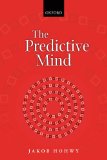November 24, 2013

The Predictive Mind by Jakob Hohwy (Oxford University Press, USA, 2013)
(paperback – 1/28/14), (amazon.co.uk – Nov 2013), (uk kindle ed.)
Book description from the publisher:
A new theory is taking hold in neuroscience. It is the theory that the brain is essentially a hypothesis-testing mechanism, one that attempts to minimise the error of its predictions about the sensory input it receives from the world. It is an attractive theory because powerful theoretical arguments support it, and yet it is at heart stunningly simple. Jakob Hohwy explains and explores this theory from the perspective of cognitive science and philosophy. The key argument throughout The Predictive Mind is that the mechanism explains the rich, deep, and multifaceted character of our conscious perception. It also gives a unified account of how perception is sculpted by attention, and how it depends on action. The mind is revealed as having a fragile and indirect relation to the world. Though we are deeply in tune with the world we are also strangely distanced from it.
The first part of the book sets out how the theory enables rich, layered perception. The theory’s probabilistic and statistical foundations are explained using examples from empirical research and analogies to different forms of inference. The second part uses the simple mechanism in an explanation of problematic cases of how we manage to represent, and sometimes misrepresent, the world in health as well as in mental illness. The third part looks into the mind, and shows how the theory accounts for attention, conscious unity, introspection, self and the privacy of our mental world.
Google Books preview:
See also: Author’s website
Comments (0)
- cognitive science,new books,philosophy of mind
November 21, 2013

Human Agency and Neural Causes: Philosophy of Action and the Neuroscience of Voluntary Agency by Jason D. Runyan (Palgrave Macmillan, 2013)
(amazon.co.uk)
Book description from the publisher:
In exploring whether our neuroscientific discoveries are consistent with the idea we are voluntary agents, Human Agency and Neural Causes presents a neuroscientifically-informed emergentist account of human agency.
In contrast with the assumptions that currently shape neuropsychological research on voluntary agency, J.D. Runyan presents a broadly-conceived Aristotelian account of voluntary agency grounded in our everyday thought about our conduct. In the process, some new concerns are raised for compatibilist theories of free will, as well as for reductive neuroscientific theory. This book argues that what contemporary neuroscience reveals is along the lines of what we should expect if we are, in fact, voluntary agents. At the same time, upholding the idea that we are voluntary agents will require profound and controversial changes in the way we interpret our neuroscientific findings.
Comments (0)
- cognitive science,new books,philosophy of mind
November 17, 2013

Mindware: An Introduction to the Philosophy of Cognitive Science, 2nd ed., by Andy Clark (Oxford University Press, USA, 2013)
(amazon.co.uk)
Book description from the publisher:
Ranging across both standard philosophical territory and the landscape of cutting-edge cognitive science, Mindware: An Introduction to the Philosophy of Cognitive Science, Second Edition, is a vivid and engaging introduction to key issues, research, and opportunities in the field.
Starting with the vision of mindware as software and debates between realists, instrumentalists, and eliminativists, Andy Clark takes students on a no-holds-barred journey through connectionism, dynamical systems, and real-world robotics before moving on to the frontiers of cognitive technologies, enactivism, predictive coding, and the extended mind. Throughout, he highlights challenging issues in an effort to engage students in active debate. Each chapter opens with a brief sketch of a major research tradition or perspective, followed by concise critical discussions dealing with key topics and problems.
NEW TO THIS EDITION
* Three new chapters (9-11) on cognitive extensions, enactivism, and the predictive brain, and a revised appendix on consciousness
* Extensive revisions, additions, and updates throughout in light of new developments in the field
* New text boxes and revised and expanded suggestions for further reading, including many electronic resources (summarized on the book’s Companion Website at www.oup/us/clark)
See also: Companion website
Comments (0)
- cognitive science,new books,philosophy of mind
November 11, 2013

Philosophical Psychopathology: Philosophy without Thought Experiments by Garry Young (Palgrave Macmillan, 2013)
(amazon.co.uk)
Book description from the publisher:
Garry Young presents examples of rare pathological conditions such as blindsight, anarchic hand, alien control and various delusional states to inform fundamental questions on topics relating to consciousness, intentional action, thought and rationality, as well as what is required to possess certain kinds of knowledge. Rather than trying to answer these questions by inventing far-fetched scenario or ‘thought experiments’, this book argues that there is a better but, at present, under-used resource available: namely, clinical case studies evidence. Thus, when inquiry as to whether consciousness must necessarily accompany our intentional action, instead of creating a philosophical zombie why not look to the actions of those suffering from blindsight or visual agnosia. Similarly, when considering whether it is possible to doubt that one thinks, why invent a malicious demon as Descartes did when one can draw on delusional evidence from those suffering from thought insertion who deny certain thoughts are theirs.
See also: Sample chapter available through publisher (pdf), Author at PhilPapers
Comments (0)
- cognitive science,new books,philosophy of mind,psychology
October 7, 2013

The Mind’s Construction: The Ontology of Mind and Mental Action by Matthew Soteriou (Oxford University Press, 2013)
(amazon.co.uk)
Book description from the publisher:
Philosophers working on the ontology of mind have highlighted various distinctions that can be drawn between the ways in which different aspects of our minds fill time. For example, they note that whereas some elements of our mental lives obtain over time, others unfold over time, and some continue to occur throughout intervals of time. Matthew Soteriou explores ways in which such distinctions can be put to work in helping to inform philosophical accounts of both sensory and cognitive aspects of consciousness. Part One of The Mind’s Construction argues that work in the ontology of mind that focuses on distinctions of temporal character has much to contribute to philosophical accounts of the phenomenology of various elements of sensory consciousness–e.g. the phenomenology of perceptual experience, bodily sensation, and perceptual imagination. Part Two argues that these ontological considerations can inform our understanding of conscious thinking, and the form of self-conscious consciousness that we have as subjects capable of engaging in such activity, by helping to account for and explain the respect in which agency is exercised in conscious thinking. This in turn, it is argued, can illuminate the more general issue of the place and role of mental action in an account of the metaphysics of mind.
Google Books preview:
See also: Author’s webpage
Comments (0)
- consciousness,new books,philosophy of mind







